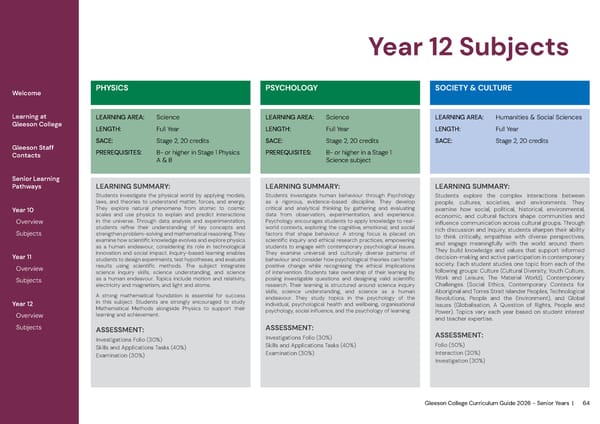Gleeson College Curriculum Guide 2026 - Senior Years | 64 Year 12 Subjects Welcome Learning at Gleeson College Gleeson Staff Contacts Senior Learning Pathways Year 10 Overview Subjects Year 11 Overview Subjects Year 12 Overview Subjects LEARNING SUMMARY: Students investigate the physical world by applying models, laws, and theories to understand matter, forces, and energy. They explore natural phenomena from atomic to cosmic scales and use physics to explain and predict interactions in the universe. Through data analysis and experimentation, students refine their understanding of key concepts and strengthen problem-solving and mathematical reasoning. They examine how scientific knowledge evolves and explore physics as a human endeavour, considering its role in technological innovation and social impact. Inquiry-based learning enables students to design experiments, test hypotheses, and evaluate results using scientific methods. The subject integrates science inquiry skills, science understanding, and science as a human endeavour. Topics include motion and relativity, electricity and magnetism, and light and atoms. A strong mathematical foundation is essential for success in this subject. Students are strongly encouraged to study Mathematical Methods alongside Physics to support their learning and achievement. ASSESSMENT: Investigations Folio (30%) Skills and Applications Tasks (40%) Examination (30%) PHYSICS LEARNING AREA: Science LENGTH: Full Year SACE: Stage 2, 20 credits PREREQUISITES: B- or higher in Stage 1 Physics A & B PSYCHOLOGY LEARNING AREA: Science LENGTH: Full Year SACE: Stage 2, 20 credits PREREQUISITES: B- or higher in a Stage 1 Science subject LEARNING SUMMARY: Students investigate human behaviour through Psychology as a rigorous, evidence-based discipline. They develop critical and analytical thinking by gathering and evaluating data from observation, experimentation, and experience. Psychology encourages students to apply knowledge to real- world contexts, exploring the cognitive, emotional, and social factors that shape behaviour. A strong focus is placed on scientific inquiry and ethical research practices, empowering students to engage with contemporary psychological issues. They examine universal and culturally diverse patterns of behaviour and consider how psychological theories can foster positive change while recognising the ethical implications of intervention. Students take ownership of their learning by posing investigable questions and designing valid scientific research. Their learning is structured around science inquiry skills, science understanding, and science as a human endeavour. They study topics in the psychology of the individual, psychological health and wellbeing, organisational psychology, social influence, and the psychology of learning. ASSESSMENT: Investigations Folio (30%) Skills and Applications Tasks (40%) Examination (30%) SOCIETY & CULTURE LEARNING AREA: Humanities & Social Sciences LENGTH: Full Year SACE: Stage 2, 20 credits LEARNING SUMMARY: Students explore the complex interactions between people, cultures, societies, and environments. They examine how social, political, historical, environmental, economic, and cultural factors shape communities and influence communication across cultural groups. Through rich discussion and inquiry, students sharpen their ability to think critically, empathise with diverse perspectives, and engage meaningfully with the world around them. They build knowledge and values that support informed decision-making and active participation in contemporary society. Each student studies one topic from each of the following groups: Culture (Cultural Diversity, Youth Culture, Work and Leisure, The Material World), Contemporary Challenges (Social Ethics, Contemporary Contexts for Aboriginal and Torres Strait Islander Peoples, Technological Revolutions, People and the Environment), and Global Issues (Globalisation, A Question of Rights, People and Power). Topics vary each year based on student interest and teacher expertise. ASSESSMENT: Folio (50%) Interaction (20%) Investigation (30%)
 2026 Gleeson College Senior Years Curriculum Guide 2026 Page 63 Page 65
2026 Gleeson College Senior Years Curriculum Guide 2026 Page 63 Page 65